

Scientists see stronger evidence of slowing Atlantic Ocean circulation, an ‘Achilles’ heel’ of the climate. The new research applies a statistical analysis to show that those measures are in sync and that nine out of 11 show a clear trend.
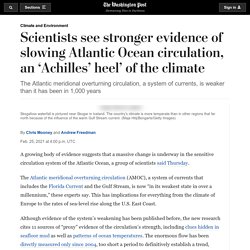
Prior research had suggested that the AMOC was at its weakest point in a millennium or more, and suggested a roughly 15 percent weakening since about 1950. But when it comes to the latest evidence, “I think it just makes this conclusion considerably stronger,” said Stefan Rahmstorf, an author of the research and an oceanographer with the Potsdam Institute for Climate Impact Research in Germany. The study was published in Nature Geoscience by scientists from the Potsdam Institute, Ireland’s Maynooth University and University College London.
The AMOC is driven by two vital components of ocean water: temperature and salt. In the North Atlantic, warm, salty water flows northward off the U.S. coastline, carrying heat from the tropics. The late climate scientist Wallace S. Northern California’s coasts are turning into underwater deserts. Earth Has Lost 28 Trillion Tons of Ice since the Mid-1990s. The world’s frozen places are shrinking—and they’re disappearing at faster rates as time goes by.
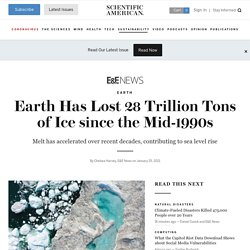
In the 1990s, the world was losing around 800 billion metric tons of ice each year. Today, that number has risen to around 1.2 trillion tons. 5 Sensational Sea Snail Species. Move out of the way, sea slugs, there’s a new charismatic critter on the block: the sea snail!
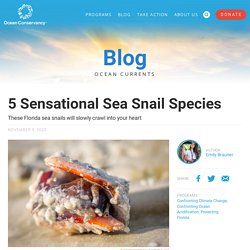
Sea snails are an extremely diverse group of marine gastropods that are found around the world. They can spend time on land, in saltwater or freshwater, be carnivores, herbivores or omnivores and vary in color, from ivory to brown, to vivid orange or pale violet. Unlike sea slugs, you’re more likely to actually see a sea snail—and without having to venture to the ocean floor. They’re typically found in salt marshes or in shallow, coastal waters. Ever visited a beach and collected shells? So, what’s so great about sea snails? Deepest Part of The Oceans - Full Documentary HD. 'One Of The Best Nature Shows': A River Transformed After Dams Come Down : NPR. 'Antarctica Melts,' NASA Says, Showing Effects Of A Record Warm Spell : NPR. The Pacific Ocean is so acidic that it's dissolving Dungeness crabs' shells. (CNN) –The Pacific Ocean is becoming more acidic, and the cash-crabs that live in its coastal waters are some of its first inhabitants to feel its effects.
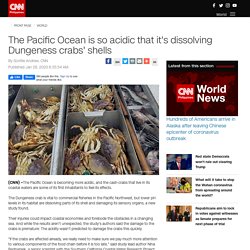
The Dungeness crab is vital to commercial fisheries in the Pacific Northwest, but lower pH levels in its habitat are dissolving parts of its shell and damaging its sensory organs, a new study found. Huge ‘hot blob’ in Pacific Ocean killed nearly a million seabirds. A million seabirds died in less than a year as a result of a giant “blob” of hot ocean, according to new research.
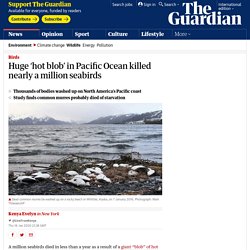
A study released by the University of Washington found the birds, called common murres, probably died of starvation between the summer of 2015 and the spring of 2016. Most dead seabirds never wash ashore, so while 62,000 dead or dying murres were found along the coasts of Alaska, Washington, Oregon and California, researchers estimate the total number is closer to 1 million. Alaska saw the most birds wash up. In Prince William Sound in southern Alaska, more than 4,500 bird carcasses were found every kilometer, or 0.62 miles.
Climate change: Oceans running out of oxygen as temperatures rise. Image copyright IUCN Climate change and nutrient pollution are driving the oxygen from our oceans, and threatening many species of fish.
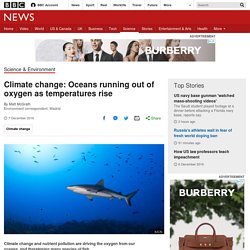
That's the conclusion of the biggest study of its kind, undertaken by conservation group IUCN. While nutrient run-off has been known for decades, researchers say that climate change is making the lack of oxygen worse. The World’s Oceans Are in Danger, Major Climate Change Report Warns. Want climate news in your inbox?
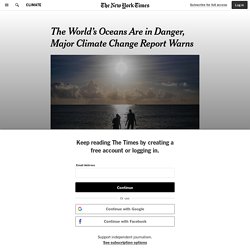
Sign up here for Climate Fwd:, our email newsletter. WASHINGTON — Climate change is heating the oceans and altering their chemistry so dramatically that it is threatening seafood supplies, fueling cyclones and floods and posing profound risks to the hundreds of millions of people living along the coasts, according to a sweeping United Nations report issued Wednesday. Seafood May Be Gone by 2048, Study Says. 'Most Destructive Pathogen Ever' Has Created Zombie-Like Apocalypse for World's Amphibians.
A terrifying new study details the havoc being wrought by what scientists call "the most destructive pathogen ever" recorded on earth, finding that with help from unwitting humans a "silent killer" has caused major declines of frogs, salamanders, and hundreds of other amphibian species.

Chytridiomycosis, or chytrid fungus, has killed off 90 species over the past 50 years while leading to huge losses of 501 kinds of frogs, toads, salamanders, and other amphibians, according to researchers from a number of worldwide universities. Nearly 125 of those species have declined by at least 90 percent due to the rapid spread of the pathogen. "We've known that chytrid's really bad, but we didn't know how bad it was, and it's much worse than the previous early estimates. " —Ben Scheele, ecologist The report, published in Science on Thursday, offers disturbing new information about a disease which scientists first detected in 1998—but whose power they didn't grasp until now.
Study of Antarctic sea ice collapse warns of potential 10-foot sea rise. A stunning new study on Antarctic sea ice collapse greatly raises the risk of a 10-foot sea level rise this century if President Donald Trump’s climate policies aren’t quickly reversed.
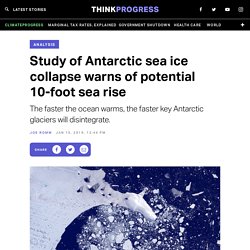
Warming ocean waters drove a 6-fold increase in annual ice mass loss from the Antarctic ice sheet between 1979 and 2017, according to a new study in the Proceedings of the National Academy of Sciences. It’s been known for a while that the West Antarctic Ice Sheet (WAIS) was unstable and collapsing at an accelerating rate due to global warming.
But the new study finds that parts of the vastly larger East Antarctic Ice Sheet (EAIS) are also disintegrating. While the WAIS contains enough ice to raise sea levels some 20 feet, the EAIS contains enough ice to ultimately raise sea levels 170 feet. The Planet Has Seen Sudden Warming Before. It Wiped Out Almost Everything. Annual 'Suffocations' Are the Forest Fires of the Ocean. Climate change: Oceans 'soaking up more heat than estimated' Image copyright Getty Images.
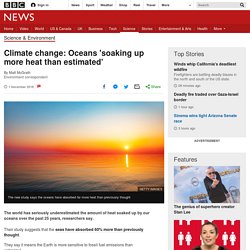
Live video of Monterey Bay, ocean exploration. Coastal Pacific Oxygen Levels Now Plummet Once A Year. More acidic oceans 'will affect all sea life'. Image copyright JAGO-TEAM/GEOMAR All sea life will be affected because carbon dioxide emissions from modern society are making the oceans more acidic, a major new report will say. The eight-year study from more than 250 scientists finds that infant sea creatures will be especially harmed.
This means the number of baby cod growing to adulthood could fall to a quarter or even a 12th of today's numbers, the researchers suggest. The assessment comes from the BIOACID project, which is led from Germany. A brochure summarising the main outcomes will be presented to climate negotiators at their annual meeting, which this year is taking place in Bonn in November. Humpback whales stop their song when human vessels make noise. Scientists have found yet another way we’re disrupting wildlife: when cargo ships start producing a lot of noise, humpback whales reduce or even stop their singing.
Image credits: Christopher Michel. Not only do whales (and other marine mammals) use sounds to communicate, but they’re much more dependent on sounds than land creatures because their other senses are so limited in water. For human ships, meanwhile, sounds are more of a side-effect. Arctic’s strongest sea ice breaks up for first time on record. The oldest and thickest sea ice in the Arctic has started to break up, opening waters north of Greenland that are normally frozen, even in summer. This phenomenon – which has never been recorded before – has occurred twice this year due to warm winds and a climate-change driven heatwave in the northern hemisphere.
One meteorologist described the loss of ice as “scary”. A Warm Water Mass Called “The Blob” Is Killing Alaska’s Cod. THE DESTRUCTIVE BLOB. In 2013, an unstoppable entity began terrorizing the Pacific. At times it spanned the entire stretch of ocean from Alaska to South America. Fish lose sense smell and ability to find food as climate change turns oceans to acid. Almost all world’s oceans damaged by human impact, study finds.
The Horrendous Way Fish are Captured for Your Aquarium—With Cyanide. On World Ocean's Day, Pictures Celebrate the Magic of the Ocean. Stunning Wave Photography by Rachael Talibart. Scientists detect major change to Earth’s oceans linked to a warming climate click 2x. Big waves generated by the Nazare canyon just off the coast of Nazare, central Portugal, in the Eastern Atlantic Ocean. (Francisco Leong/Agence France-Presse via Getty Images) Nature Is Speaking – Harrison Ford is The Ocean. Nature Blows My Mind! The Flamboyant Sea Slug. Nicoboxethai/CC BY 2.0 Nudibranch, or what we usually call sea slugs, blow my mind.
This-is-how-super-smart-octopuses-are. A Big Fish Sells For Over Half A Million — But Other Big Questions Persist. 15+ Sea Slugs That Prove Aliens Already Live On Planet Earth click 2x. Giant octopus found hiding in plain sight. Which Fish are the Best, Safest & Healthy to Eat? Common Loon (Gavia immer) Visit us for... - The world of birds.